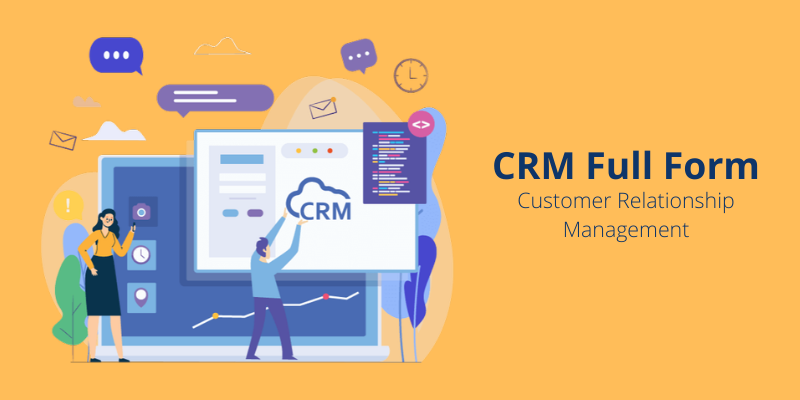CRM Full Form: Customer Relationship Management
CRM Full Form
The full form of CRM is Customer Relationship Management. CRM is defined as a process of managing and retaining relationships with an organization’s existing customers and prospects to drive its growth and increase profitability.
What is CRM
Customer relationship management (CRM) technology organizes all interactions with customers and potential customers to enhance business relationships. A CRM system keeps companies connected to customers, streamlines processes, and boosts profits.
When discussing CRM, it often refers to a system or platform aiding contact management, sales, productivity, and more.
CRM software focuses on managing relationships with individuals like customers, colleagues, or suppliers throughout their lifecycle, from acquiring new customers to providing ongoing support.
Sales and marketing teams can use a CRM solution to track and improve customer interactions, refining each touchpoint to enhance the overall customer experience.
Features
- CRM is a strategy involving deciding how the relationship with existing and future customers should be managed.
- CRM is a process which a company adopts to develop and maintain those relations
- CRM is a company’s cloud-based technology to record, report and analyze communication with its customers.
CRM value chain explains the process that enables a company to grow by increasing its marketing productivity and using its customers.
The following is the necessary steps to implement the CRM strategy successfully-
1. Customer portfolio analysis
First, an organization must analyze and classify its customer base to determine the segments of the most profitable customers. This will help in giving major attention to the target customer base.
2. Interaction with customers
This process helps a company build relationships with individual customers within its target customer base by collecting information about their buying habits, dates of anniversary or birthdays or both, and feedback. This information will be stored by compiling a customer database across different channels or points of contact between the customer and the company.
3. Network development
This step involves identifying and developing strong relationships with the company’s stakeholders, such as suppliers, investors, and employees.
4. Value proposition development
This step involves working with the information collected from the customers and creating a tailored value proposition for them, thereby adding to the organization’s value.
5. Customer life cycle management
The customer life cycle refers to a journey from a potential client to a product/service advocate. Its focus is on matters related to acquiring, developing, and retaining customer relationships and measuring the CRM process’s performance.
CRM Software
CRM software is a system that collects and manages all the information and documents related to the customers into a single CRM database, providing an organized perspective of the customer and employee relationship. Data related to customer contact information, such as email, telephone, website, social media profile, and personal preferences, are stored in the software. CRM software improves customer relationship management by recording their interactions with the company through email, telephone, website, and social media profiles.
Components of CRM
The components of the CRM include the automation of various workflows to transform leads into full-fledged customers. It assists in problem-solving and information dissemination, allowing managers to track performance and productivity based on the logged information. These are as follows-
- Marketing automation
- Salesforce automation
- Contact center automation
- Geolocation technology
- Workflow automation
- Lead management
- Human resource management (HRM
- Analytics
- Artificial intelligence (AI) technologies
Types of CRM Technology
The types of CRM technology available are as follows:
On-premises CRM: This system enables the company CRM system to manage, control, administer, and maintain its database and information under the company’s servers, and the user assumes the cost of any upgrades.
Cloud-based CRM: Cloud-based CRM, also known as SaaS (software as a service) or on-demand CRM, enables the company to store data on an external, remote network that employees can access anytime, anywhere through an internet connection. A third-party service provider may provide the installation and maintenance.
CRMs tailored to specific industries: These CRMs are specially designed to meet the unique needs of various industries. Dedicated CRM software tools are quite common, especially for sectors like real estate, healthcare, insurance, finance, media, hospitality, and more.
Comprehensive CRMs: The most popular cloud-based solutions are typically all-in-one platforms offering extensive features, high customization options, and seamless integration with many other business software tools. These platforms offer a complete view of your business, including sales pipelines, forecasts, and detailed contact information. They are packed with features that are secure and user-friendly, making them beneficial for businesses of all sizes and industries and leading to improved sales operations.
Benefits Of CRM
- A business can create followers or fan page for the company on a social media platform. It is joined by the people who like the products, thus creating a productive destination for communication, marketing and networking.
- Data analytics and reporting help track and analyse customers’ buying habits, allowing for easy tracking of periodic sales.
- It improves cohesiveness among sales, marketing, and customer service departments as they share a common CRM platform.
- Automation of tasks makes Employees focus their efforts on managing the leads and closing the deal instead of putting their time into completing smaller tasks like form filling, generating a receipt, and sending reports to seniors while selling a product. The CRM system can easily perform these tasks.
- CRM systems can manage the relationship with the supplier and partners, thus enabling efficient supply chain management.
How CRM Work
People Also Reading:

